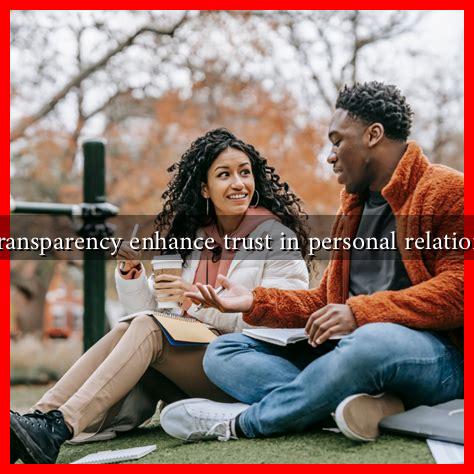-
Table of Contents
- Can Transparency Enhance Trust in Personal Relationships?
- The Importance of Trust in Relationships
- What is Transparency?
- How Transparency Builds Trust
- 1. Reducing Uncertainty
- 2. Fostering Emotional Safety
- 3. Building Accountability
- Real-Life Examples of Transparency Enhancing Trust
- Challenges to Transparency
- Practical Tips for Enhancing Transparency
- Conclusion
Can Transparency Enhance Trust in Personal Relationships?
In an age where communication is often digital and relationships can feel superficial, the concept of transparency has emerged as a vital component in building trust. Transparency in personal relationships refers to the openness and honesty between individuals, allowing them to share thoughts, feelings, and intentions without fear of judgment. This article explores how transparency can enhance trust in personal relationships, supported by research, examples, and practical insights.
The Importance of Trust in Relationships
Trust is the foundation of any healthy relationship, whether it be romantic, familial, or platonic. According to a study published in the Journal of Social and Personal Relationships, trust is directly linked to relationship satisfaction. When individuals feel secure in their relationships, they are more likely to engage in open communication and emotional sharing.
What is Transparency?
Transparency involves being open about one’s thoughts, feelings, and actions. It means sharing information that can affect the relationship and being honest about one’s intentions. Here are some key aspects of transparency:
- Open Communication: Sharing thoughts and feelings openly.
- Accountability: Taking responsibility for one’s actions.
- Vulnerability: Being willing to show one’s true self, including fears and insecurities.
How Transparency Builds Trust
Transparency can significantly enhance trust in personal relationships through several mechanisms:
1. Reducing Uncertainty
When individuals are transparent, they reduce ambiguity in their relationships. This clarity helps partners understand each other better, leading to fewer misunderstandings. A study by the University of California found that couples who practiced transparency reported higher levels of relationship satisfaction.
2. Fostering Emotional Safety
Transparency creates an environment where individuals feel safe to express their thoughts and feelings. This emotional safety encourages deeper connections and allows partners to be vulnerable with one another. For instance, a couple that openly discusses their fears about the future is more likely to navigate challenges together than one that avoids such conversations.
3. Building Accountability
When individuals are transparent about their actions and decisions, they hold themselves accountable. This accountability fosters trust, as partners can rely on each other to be honest and responsible. For example, in a workplace friendship, being transparent about workload and deadlines can prevent resentment and build a stronger bond.
Real-Life Examples of Transparency Enhancing Trust
Several case studies illustrate how transparency can enhance trust in personal relationships:
- The Role of Transparency in Marriage: A study published in the Journal of Marriage and Family found that couples who practiced transparency regarding finances reported higher levels of trust and satisfaction in their marriages.
- Friendship Dynamics: Research from the University of Michigan showed that friends who shared personal struggles and challenges were more likely to develop a deeper bond, enhancing trust and support.
Challenges to Transparency
While transparency is beneficial, it is not without challenges. Some individuals may fear that being too open could lead to vulnerability or rejection. Additionally, cultural differences can influence perceptions of transparency. In some cultures, direct communication may be viewed as disrespectful, complicating the practice of transparency.
Practical Tips for Enhancing Transparency
To foster transparency in your personal relationships, consider the following tips:
- Practice Active Listening: Show genuine interest in your partner’s thoughts and feelings.
- Share Your Feelings: Be open about your emotions and encourage your partner to do the same.
- Set Boundaries: Establish what transparency means for both parties to avoid discomfort.
Conclusion
In conclusion, transparency plays a crucial role in enhancing trust in personal relationships. By fostering open communication, emotional safety, and accountability, individuals can build stronger, more fulfilling connections. While challenges exist, the benefits of transparency far outweigh the risks. As we navigate the complexities of modern relationships, embracing transparency can lead to deeper trust and lasting bonds.
For further reading on the importance of trust in relationships, you can visit Psychology Today.

